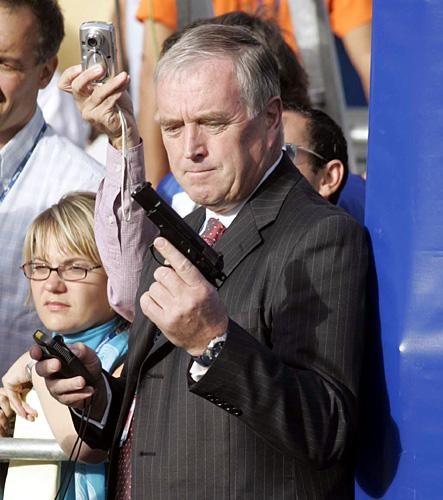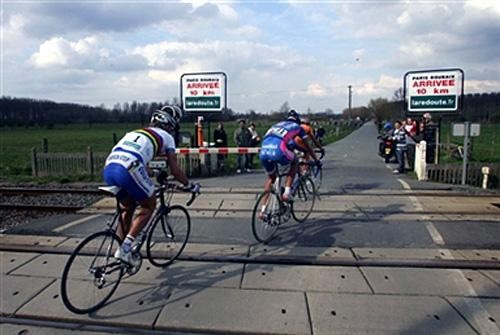UCI's McQuaid responds to Roubaix controversy
By Shane Stokes UCI president Pat McQuaid has weighed in to the debate over Sunday's...


"Safety is the most important consideration"
By Shane Stokes
UCI president Pat McQuaid has weighed in to the debate over Sunday's disqualification of the second, third and fourth-placed riders in this year's Paris-Roubaix. Leif Hoste (Discovery Channel), Peter Van Petegem (Davitamon-Lotto) and Vladimir Gusev (Discovery Channel) forfeited their placings for passing through a closed level crossing, while a group containing Tom Boonen that crossed after the train had passed but the barriers were still down was not penalised.
The riders, their directeurs sportifs and the race organisers have said that the decision was a severe one and that as it didn't affect the result in any real way, the UCI commissaires could have let the riders off with a warning. In response, McQuaid has clarified the reasons for the decision, explaining to Cyclingnews why he feels that the judges had no other choice.
"I agree that it is a very difficult decision, a very severe decision for the three riders," he said by phone on Monday. "It was obviously also a difficult decision for the commissaires to come to, and this is probably reflected in the amount of time it took to arrive at the decision. But having said that, the rules are the rules. The riders know that, I'm sure it is not the first time they have been in that situation. From my point of view, the most important thing is that you must consider all the young cyclists who were watching that television coverage yesterday. If they saw those riders going through those gates and took that as example of what you can do and get away with, you can imagine the potential danger in future races.
"Whilst I do agree that a lot of rules can be interpreted in relation to the spirit of the law, I feel that in this case the commissaires didn't really have a choice. It is a rule that you cannot really play with because of the inherent danger in allowing some thing like that pass by without sanctioning it."
Many people have asked why the next group containing Tom Boonen wasn't also disqualified. After all, they too passed through the same barriers while they were down. However McQuaid feels that there is an important distinction between the two cases. "The train had passed by that point so they therefore knew that the danger was gone," he argues. "It was different with the first group. If that had been a high-speed train and one of the three chasers was still crossing over the tracks, look at what could have happened."
Get The Leadout Newsletter
The latest race content, interviews, features, reviews and expert buying guides, direct to your inbox!
Prior to assuming the role of UCI President, McQuaid worked as a race promoter and organiser and says that there have been many times when he has had to stop breaks and groups at train lines. When asked if it is acceptable that a ProTour event should be subject to this kind of disruption, he says that it is difficult to avoid.
"Cycling is a fully live sport, it is something which takes place out in the real world rather than a stadium. There are so many variables which can come into play in a bike race, so it means it is very difficult to have full control over things. Normally, if an organiser knows that there is a railway crossing on a race course, they make contact with people in advance of the race, find out when trains are coming through and see what can be done.
"In some cases, an organisation may make an arrangement in advance that if it is only a goods train or a train which is not on a particularly high-speed line, that some arrangement can be made to stop the train and let the race pass by. But that is only in cases where the lines aren't particularly important. In the case of high-speed lines, that cannot be done. It is just an unfortunate situation within the race which has to be accepted."
Under current rules, had Fabian Cancellara been stopped, he would have been compensated for the delay. "The normal ruling is that he would be given his advantage again," says McQuaid. "The commissaires would have put a watch on and given him the same time gap once the barrier was raised. But once the leader is through, you can't stop him at that point.
"I understand the situation for those riders, having ridden for over 200 kilometres in very rough terrain and going at full belt at the time in trying to stay clear of Boonen's group to catch the leader. I do agree that the action had no material effect on the result of the race, because Cancellara was already well gone. But by the same token those riders knew what the rules were. I am sure it is not the first time that they have encountered something like that. Unfortunately there wasn't really a choice, as safety has to come first in a situation like this."